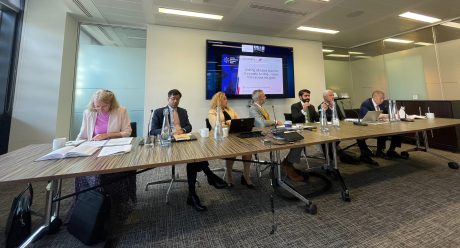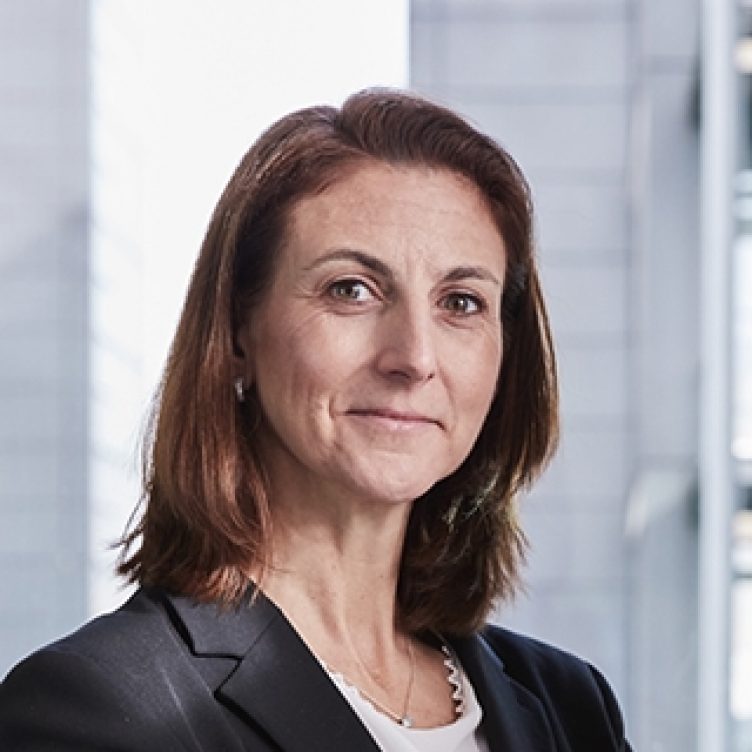As part of London International Disputes Week 2024, an expert panel of representatives from various jurisdictions met at Stewarts’ London office to discuss attitudes towards third-party litigation funding in arbitral and court proceedings. The session was co-hosted by legal finance and risk management firm Asertis.
Addressing the state of third-party funding in England and Wales, the EU, India, Singapore and the Middle East, the panellists discussed potential advantages in and scope of rules and regulations around third-party funding, including:
- percentage caps on funder recoveries,
- recoverability of funding costs from the opponent party,
- safeguards for funded parties.
They also considered the potential impact of regulating third-party funding on the popularity of a jurisdiction for international dispute resolution.
This LIDW session was chaired by Julian Chamberlayne, Risk and Funding Partner at Stewarts, with panellists including:
- Professor Rachael Mulheron KC (Hon), Professor of Tort Law and Civil Justice at Queen Mary University of London
- Sanjeev Kapoor, Dispute Resolution Partner at Khaitan & Co
- Dr Aseel Zimmo, Managing Partner at The First Link, arbitrator and mediator
- Christopher Lau SC, Senior Counsel and Chartered Arbitrator at 3 Verulam Buildings
- Erik Bomans, Chief Executive Officer at Deminor Litigation Funding
- Harshiv Thakerar, Chief Investment Officer at Asertis
This summary of the session by Julian and co-ordinator Fiona Gillett addresses each jurisdiction in turn, considering current attitudes to and perceptions of third-party funding.
England and Wales
Professor Mulheron described how since 1994 (in Giles v Thompson), a large body of caselaw has established a benevolent judicial attitude towards third-party funding. She observed that the introduction of the Arkin Cap on funder liability for adverse costs was not put forward by counsel, but developed by judges, and subsequent developments have also demonstrated the intellectual involvement of the judiciary in this area.
The Supreme Court PACCAR ruling in 2023 has temporarily restricted third-party funders from charging success fees calculated as a percentages of damages. The post-PACCAR classification of funding agreements as damage based agreements (DBAs) was inconsistent with the Lord Justice Jackson’s seminal review of Civil Costs that had led to the DBA Regulations 2013, given that the Jackson reports treated DBAs and LFAs as different funding streams. While the Litigation Funding Agreements (Enforceability) Bill was introduced to Parliament to reverse this unexpected development, and formalise rules around funding more broadly, it has been shelved following the UK general election called for July 2024. Suggesting PACCAR will likely prove a bump in the road rather than a fatal intervention, Harshiv and Julian agreed reviving and passing the Bill should be a priority for the next government to facilitate access to justice.
Professor Mulheron noted that capping funder recoveries is a sensitive subject. According to a questionnaire issued to funders as part of research conducted by Professor Mulheron for the Legal Services Board, not one funder had litigation funding agreements (LFAs) which provided for a percentage based fee of more than a 50% share of the funded party’s recoveries. However, it is common for funding agreements to involve the higher of a multiple or percentage, and developments within long running cases can result in multiple-based funder returns that reduce the net proceeds left for the claimants to less than 50%. Since PACCAR, when funders have had to pivot to multiple-of-costs, the LSB report found that some cases had been less beneficial to clients, in that the success fee payable to the funder was greater or likely to be greater than it would have been as a percentage-of-recovery.
The panellists agreed that a 50% cap on funder recoveries (whilst having some form of domestic precedent set for commercial cases under the DBA legislation, per reg 4(3) of the DBA Regulations 2013) would be unhelpful as it would render many potential cases unattractive for funders. The much-publicised sub-postmaster class action against the Post Office was cited as one such example.
Recovery of funding costs (ie the funder’s success fees) from the opponent is an equally controversial subject, which is currently discretionary in some English seated arbitrations but has never been allowed in English litigation, even when success fees on lawyers CFA fees and ATE premiums were recoverable prior to LASPO 2012. Another hot issue in collective proceedings is whether success fees should be paid out before or after compensation to class members.
The panellists agreed that formally introducing safeguards for parties taking on third-party funding would be a positive move in England and Wales. While a number of important safeguards are already included in the ALF code of conduct, largely drawn from caselaw, regulation would bolster what has already been established (and would stipulate enforceable requirements of capital adequacy).
The EU
The position on third-party funding across the European Union is similar to that in England and Wales. There has been a long-term liberal attitude to funding across Europe, with some discrete issues arising in recent years. The most contentious trends have manifested around large collective redress cases, more so than ‘traditional’ litigation or arbitration.
The Netherlands has been the most active within the EU on these issues. For collective redress cases, funders need to comply with a claims code that was initially proposed as a set of recommendations but has been adopted by the courts as formal rules. It has also been established that funders should not receive more than 25% of total class action damages.
Mr Bomans suggested that recent proposals by the European Parliament to put stricter limits on third-party funding were an unhelpful intervention. These proposed measures include limiting funders to a 40% recovery and preventing funders from receiving preferential returns. He felt that these proposals were overly influenced by strong lobbying from corporate-funded interest groups and based on false assumptions of third-party funding causing proceedings to become longer and more costly. That said, the European Commission seems to be taking a more pragmatic view of these issues and he considered it unlikely that all of the Parliamentary recommendations will become law.
Singapore
In 2017, legislation was introduced in Singapore that expressly allowed for funding in international arbitration and in-court mediation proceedings. Four years on, this expanded to domestic arbitration and other court proceedings connected to arbitration, and recently, in two cases with no apparent connection to arbitration, third-party funding was seemingly permitted on the basis of advice provided on the current state of the common law in Singapore and with the appropriate disclosures being made.
There are currently no explicit rules on percentage caps or limits on funder recoveries, and Mr Lau stated that this is not a topic of debate in Singapore. In contrast, recoverability of funding costs against an opponent is a live topic and the prevailing trend is to allow recovery. In 2020, a tribunal stated it had the power to award not only a party’s legal costs but also its “other costs” which included third-party funding costs, but it declined to do so; a year later third-party funding costs were awarded in a Singapore-seated International Chamber of Commerce arbitration on similar grounds.
Singapore has rules in place on safeguards for funded parties, set by both governing bodies and the courts themselves. These rules set transparency and accountability expectations and encourage funders to behave to as high a standard as possible. Lawyers are not permitted to accept referral fees or commissions from third-party funders and must disclose their clients’ third-party funding arrangements.
Mr Lau concluded that formal rules on funding have had an overwhelmingly positive response in Singapore, and have strengthened its arbitral ecosystem . Following the changes introduced in 2017, Singapore has a growing reputation as a leading jurisdiction internationally that has been bolstered by embracing third-party funding.
Helpfully, Mr Lau also took the audience on a whistlestop tour of the current position on third-party funding in Hong Kong, China, Japan, Korea and Malaysia.
The Middle East
While there has been significant interest in third-party funding of late, in particular related to major construction projects, there is almost no regulation on funding in the Middle East save for in some offshore zones including the Abu Dhabi Global Market (ADGM) and the Dubai International Financial Centre (DIFC). In these areas, where versions of common law and the English Civil Procedure Rules apply, practice directions have been issued on funding including requirements such as notifying the other side of the existence of funding arrangements.
Access to justice is prompting discussions on stances towards funding amongst the Middle East judiciary and Dr Zimmo suggested it is only a matter of time before wider provisions emerge. Caps on funder recoveries are yet to be decided, and the default is to comply with the contractual terms of a funding agreement unless contrary to public policy. Recoverability of legal costs has been a hot litigation topic in Bahrain in particular: the Chief Justice has stated that if a party can prove actual costs, they should be recoverable, but in practice recovery of basic costs is very limited, so there is little current prospect of regulation going a big step further and allowing recovery of funding costs. The ability for a party to recover funding costs in arbitrations seated in the region is likely to turn on jurisdiction of the tribunal, and whether it has the power to award cost by the terms of the arbitration agreement.
Both Bahrain and Dubai are looking to Singapore as a model for commercial proceedings and are considering new provisions related to funding, primarily based around identification of the funder and the duty of impartiality and independence. Dr Zimmo said that, in time, caselaw is likely to establish how much information must be disclosed.
Given the Middle East’s current drive to establish itself as open for business, and a desire as part of that to become an arbitration hub, further developments on the role of funding in the jurisdiction are likely. Questions do remain over whether third-party funders would need to be local to the region to be licensed to fund cases being determined there.
India
Mr Kapoor explained that the legal position on litigation funding in India is clear, albeit not in the way we understand third-party funding today. The first case to mention funding dates back to 1852, and later caselaw has established no prohibition on the practice, explicitly citing access to justice (though notably, Indian lawyers are barred from working on a contingent fee basis). Funding did come into the spotlight in a High Court judgment in June 2023 where a third-party-funded claim failed and the court ruled the winning party’s costs could not be recovered from funders in arbitration cases, although it laid no restrictions on the concept of funding arbitration cases.
Third-party funding in India has traditionally involved one-time backing of claims rather than the dedicated funder businesses that are commonplace in England and Wales, and elsewhere. India does not cap funder recoveries, but courts have occasionally set aside LFAs if they are extortionate, unreasonable or unconscionable – one example that fell afoul of this was drafted so the funder would receive 75% of the proceeds. As in the Middle East, the terms of an LFA cannot contradict public policy.
In 2017 and in 2024, expert bodies have issued recommendations that the government should introduce clear rules around litigation funding. Mr Kapoor proposed that such rules would be useful for India to make the jurisdiction attractive, but that any regulatory legislation should be light touch. A clear structure that funders could use as a basis to approach cases brought in India would be helpful, in part to counteract other concerns including slow judgments due to lack of court resources and lack of clarity around withdrawing money due to foreign exchange controls (though these problems are not unique to India and are faced by numerous jurisdictions).
Conclusion
Professor Mulheron rounded out the session nicely with her view that the LSB report on litigation funding had generated significant public interest, demonstrating the value of third-party funding as a tool in our society. The Post Office litigation has proven a good example of how funding provides parties with the ability to get their grievances into a courtroom, something that cannot be undervalued in a functioning, fair justice system.
You can find further information regarding our expertise, experience and team on our Litigation Costs and Funding page.
If you require assistance from our team, please contact us.
Subscribe – In order to receive our news straight to your inbox, subscribe here. Our newsletters are sent no more than once a month.







